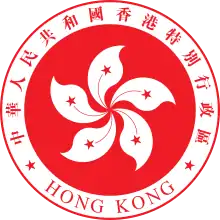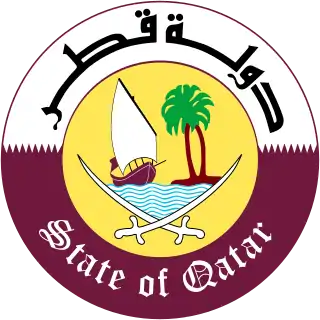Hong Kong–Qatar relations
Hong Kong–Qatar relations refers to bilateral foreign relations between Hong Kong and Qatar. While both Qatar and Hong Kong are geographically small and in separate regions of the Asian continent, the connections between the two have a long history.[1]
 | |
Hong Kong |
Qatar |
|---|---|
Historically, foreign trade between the two could possibly be traced back to the pre-modern period, as characteristics of archaeological finds discovered from both areas could have possibly indicated.[2] For a long period in the 20th Century, both Hong Kong and Qatar were influenced by the United Kingdom, with the former as a British colony and the later as a British protectorate. In 1971, Qatar claimed independence from the United Kingdom. Hong Kong, at that time still a colony of the United Kingdom, strictly follow the British in diplomacy and immediately recognized the independence of Qatar. Only after 1997 when Hong Kong was withdrawn from the British Empire, the two sides were able to independently develop foreign relations in a broad range of appropriate fields.[3]
Qatar has a Consulate General in Wan Chai, Hong Kong Island in Hong Kong.[4]
Qatar is Hong Kong's important trade partner in the Middle East since the 20th century.[5] Hong Kong's total exports to Qatar is US$30 million in January-March 2016. Major export items included telecom equipment and parts (US$10 million), jewellery (US$6 million) and travel goods & handbags (US$3 million). Hong Kong's imports from Qatar is US$25 million in the first three months of 2016, petroleum oils (other than crude)(US$19 million, 74.3% of total) and polymers of ethylene in primary forms (US$2 million, 7% of total) are the primary imports.[6]
To bolster the economic and trade connections between the two places, and offer added incentives for companies in Qatar to do business or invest in both places, as suggested by KC Chan, the then Hong Kong Secretary for Financial Services and the Treasury who led the negotiation,[7] Hong Kong and Qatar agreed on The Treaty for the Avoidance of Double Taxation and The Prevention of Fiscal Evasion with Respect to Taxes on Income in 2013.[8] Under the agreement, double taxation, especially profits from international shipping transport earned by the other side's residents in another place, is avoided. In addition, the treaty has incorporated an article on exchange of information.[9]
While Qatar and Hong Kong both situated on the One Belt, One Road region, a strengthened bilateral ties between Hong Kong and Qatar were encouraged by the government representatives of both sides in the international meeting in 2015.[10] Hong Kong government has initiated a One Belt, One Road scholarship for students in the One Belt, One Road region, which includes Qatar, to apply for free higher educational opportunities in Hong Kong.[11] The proposal reflected in a strong rejection among Hong Kong public as it was believed by some to be a wastage of Hong Kong's tax revenue to flatter a strategy proposed by the Chinese government. In response to the criticism, the scholarship was later also opened to Hong Kong citizens who have plans to study abroad in the One Belt, One Road region, including Qatar.[12] On top of the disputes, the immigrant policy of Qatar was treated as an indicator for Hong Kong media in reviewing their local policy, which stirred up the discussion in Hong Kong.[13]
Both nations are members of the International Monetary Fund, World Trade Organization. The relations between the two are mainly based on economic, social and cultural aspects because Hong Kong is restricted by Hong Kong Basic Law from concluding military bilateral agreements with foreign countries.[14]
References
- 楊漫克等:《中東, 中國:波斯灣戰爭的糾葛》,香港 : 百姓文化事業有限公司, 1991年。
- “Yazhang and Shipai: Examining the Relationship between Hong Kong and Asia through the Heritage on Tai Wan", in The Journal of Chinese Historical Researches, vol. 90(June, 2014), pp. 1-23.
- Hong Kong Basic Law Chapter VII : External Affairs
- Consulate General of Qatar in Hong Kong, Hong Kong
- Hong Kong-Middle East trade statistics, Hong Kong : the Chamber, [1970].
- 卡塔爾市場概況
- "Hong Kong, Qatar tax treaty signed (with photos)", Hong Kong Government Press Release
- AGREEMENT BETWEEN THE GOVERNMENT OF THE HONG KONG SPECIAL ADMINISTRATIVE REGION OF THE PEOPLE's REPUBLIC OF CHINA AND THE GOVERNMENT OF THE STATE OF QATAR FOR THE AVOIDANCE OF DOUBLE TAXATION AND THE PREVENTION OF FISCAL EVASION WITH RESPECT TO TAXES ON INCOME
- "Hong Kong, Qatar tax treaty signed (with photos)", Hong Kong Government Press Release
- SCED exchanges views with local consulate representatives of Middle East countries on business opportunities under "Belt and Road" initiative (with photo)
- "10億獎學金吸一帶一路學生",《蘋果日報》,14-1-2016
- "一帶一路獎學金港生也可申請",《星島日報》,27-4-2016
- 毫不光采的勝利:香港勝卡塔爾(移民工待遇大賽)
- Hong Kong Basic Law Chapter VII : External Affairs

